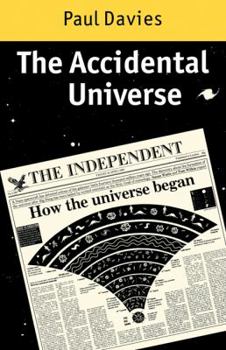The Accidental Universe
Select Format
Select Condition 
Book Overview
In The Accidental Universe renowned expositor Paul Davies grapples with the most fundamental questions of all. What is our purpose and the purpose of the universe? Are both an accident of nature? Paul... This description may be from another edition of this product.
Format:Paperback
Language:English
ISBN:0521286921
ISBN13:9780521286923
Release Date:October 1982
Publisher:Cambridge University Press
Length:152 Pages
Weight:0.54 lbs.
Dimensions:0.4" x 5.4" x 8.4"
Customer Reviews
1 rating
An awe-inspiring little book.
Published by Thriftbooks.com User , 19 years ago
Davies says the numerical values that nature has assigned to the fundamental constants--like the charge on the electron, the mass of the proton, and the Newtonian gravitational constant--are critical to the structure of the universe we perceive. Many characteristics of systems--from nuclei to galaxies--are very sensitive to the values of the fundamental constants. Had nature chosen a slightly different set of numbers, the world would be a very different place. Most likely, we would not be here to see it. Here's one example: Since liquid oceans have existed on Earth for the greater part of the history of the solar system, the temperature and luminosity of the sun can't have varied very much. This long-term, stable environment is due to the sun not using up its fuel too fast. The rate at which nuclear fuel is consumed inside a star depends on the star's luminosity. Luminosity depends on the strength of gravity, and on electromagnetism. Roughly, the lifetime of a star is given by its total energy reserves divided by the rate of energy consumption. Davies' calculations show that the lifetime of a typical star is comparable to the present age of the universe, which is correct. From this example, we can see that if gravity were stronger, stars would burn out faster. An increase by a factor of 10 in the gravitational constant would have changed everything. The earth would no longer exist. It would have been vaporized as the sun approached its red giant phase at the end of its hydrogen consumption. Thus, the extremely long time-scale required for major cosmic change is directly attributable to the weakness of gravity. It seems that a hidden principle is at work, organizing the universe in a coherent way. Some scientists say this principle is not a physical one, but an anthropic one. The anthropic principle takes several forms. One says that if the fundamental constants had had significantly different values, we would simply not be here to comment on them. Another edges on special creation, saying that "The Universe must be such as to admit the creation of observers within it at some stage." Still another suggests that our very special cosmos is only one example of a limitless variety of actually existing universes. Whatever your take on the subject, this book is beautiful and awe-inspiring.





